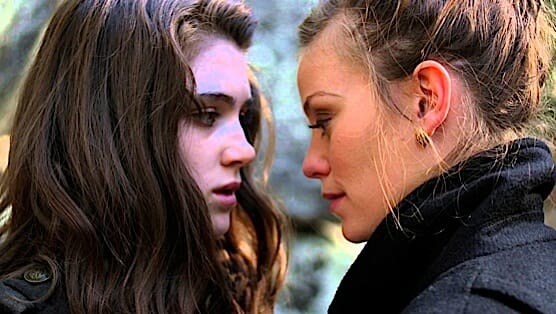Don’t Look Back

“You’re such a trope,” a vengeful young woman in William Dickerson’s cagey psycho-thriller shouts at an interfering interloper. The barb’s recipient responds with a blank look, to which the issuer drives home her point, angrily stamping, “A cliché!” which, and sans intent, borders on camp as Dickerson’s low-budget/high-ambition effort brims blissfully with said overused motifs. A quick autopsy of Don’t Look Back (an overused maxim in its own right) yields elements from such “bad seed” staples as The Dark Half, Misery and Single White Female—all, already formulaic genre, boosted above mainly by talents of those involved.
On the plus side, Don’t Look Back begins so wobbly—at a near soft-core level—that the budding confidence and moody acumen it generates midway through almost bristles with a sense of auteur bravado. The house of psychological cards builds around a young writer (Lucy Griffiths of TV’s True Blood) who’s made a name for herself with a beloved YA series based on her troubled childhood—some sort of a blend of The Hunger Games and fairytale archetypes. From inside the claustrophobic office of her shrink (Kate Burton), we learn that Nora’s grandmother (who raised her) has just passed. To deal with the estate and find a new slice of inspiration for the next volume in the series, Nora decides to returns to the snow-capped mountain high near Palm Springs where she grew up.
Specters of Nora’s past pop up immediately—her high school nemesis (Leslie Murphy), now a realtor, wants to buy the wooded manse; the town hunk (Tyler Jacob Moore), who’s always had a thing for Nora, is now the sheriff; and her grandmother’s old boyfriend (former wrestler “Rowdy” Roddy Piper giving a surprisingly nuanced performance), keeps dropping by for an avuncular chat. Suffice to say, there’s tons of old skeletons in Nora’s house that remain respectfully in their closets until—and through random happenstance—Nora takes on the freewheeling Peyton (a limpid-eyed Cassidy Freeman) as a roommate, and the little horrors begin to spill out. Peyton’s an artist, like Nora, so there’s that instant kinship there, even some bi-interest, but as Nora’s past starts to well up, Peyton begins to act in ways that are both undermining and protective.